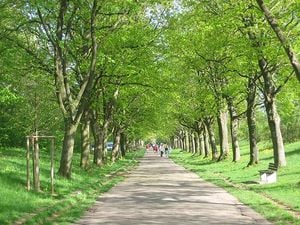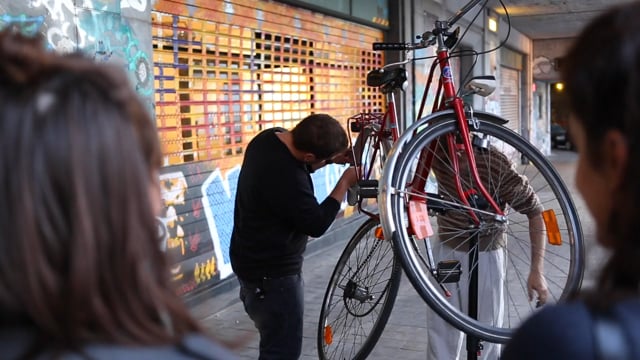
The aim of this page is to recognise, celebrate and encourage the self-empowerment of community agency networks (CANs) and community groups' activism for climate, environment and many other sustainability topics across Brussels.
 ‘We can live again’: Belgian nursing home residents hit the nightclubs, theguardian.com (May 02, 2024)
‘We can live again’: Belgian nursing home residents hit the nightclubs, theguardian.com (May 02, 2024)  Bollards and ‘superblocks’: how Europe’s cities are turning on the car, theguardian.com (Dec 18, 2023)
Bollards and ‘superblocks’: how Europe’s cities are turning on the car, theguardian.com (Dec 18, 2023)  Permanent climate assembly in Brussels, buergerrat.de (Feb 04, 2023)
Permanent climate assembly in Brussels, buergerrat.de (Feb 04, 2023)
Networks and sustainability initiatives[edit | edit source]
Community resources[edit | edit source]
- Community Land Trust Brussels Community Land Trust Brussels
Food activism[edit | edit source]
- BEES coop, social, not-for-profit co-operative, Brussels
Cycling[edit | edit source]
The Gordelroute is a permanent cycle route encircling Brussels, based on De Gordel. It does not follow the same route as that used in the event, mainly following quieter roads and cycle paths, but is approximately the same distance (100 km). W
Villo! (a portmanteau of the French words ville ("city") and vélo ("bicycle")) is a public bicycle rental programme in Brussels-Capital Region, Belgium. It was launched on 19 May 2009 in cooperation between the Brussels-Capital region and the company JCDecaux as a replacement of the former scheme Cyclocity, launched in 2006.
The scheme is currently in its second phase of expansion which will see a system of 5,000 bikes in all of the municipalities of the Brussels region by 2013, making it one of the biggest in the world.
Funding[edit | edit source]
BrusselsTogether, "lets you create a virtual association so that you can get started in no time and focus on what you want to do to improve Brussels"
Maps[edit | edit source]
Plasticfree options in Brussels, July 2015, Yes! my life is plasticless
Other resources[edit | edit source]
- 'Essential Guide to Doing Transition' in French
- How to organise sustainable meetings & events in Brussels, (PDF) A practical guide, www.iclei-europe.org
About Brussels[edit | edit source]
Brussels (French: Bruxelles, pronounced [bʁysɛl] or [bʁyksɛl] ; Dutch: Brussel [ˈbrʏsəl] ), officially the Brussels-Capital Region (French: Région de Bruxelles-Capitale; Dutch: Brussels Hoofdstedelijk Gewest), is a region of Belgium comprising 19 municipalities, including the City of Brussels, which is the capital of Belgium. The Brussels-Capital Region is located in the central portion of the country and is a part of both the French Community of Belgium and the Flemish Community, but is separate from the Flemish Region (within which it forms an enclave) and the Walloon Region, located less than 4 kilometres (2.5 mi) to the south. Historically Dutch-speaking, Brussels saw a language shift to French from the late 19th century. Nowadays, the Brussels-Capital Region is officially bilingual in French and Dutch, although French is the majority language and lingua franca. Brussels is also increasingly becoming multilingual. English is spoken widely and many migrants and expatriates speak other languages as well.
Brussels grew from a small rural settlement on the river Senne to become an important city-region in Europe. Since the end of the Second World War, it has been a major centre for international politics and home to numerous international organisations, politicians, diplomats and civil servants. Brussels is the de facto capital of the European Union, as it hosts a number of principal EU institutions, including its administrative-legislative, executive-political, and legislative branches (though the judicial branch is located in Luxembourg, and the European Parliament meets for a minority of the year in Strasbourg). Because of this, its name is sometimes used metonymically to describe the EU and its institutions. The secretariat of the Benelux and the headquarters of NATO are also located in Brussels.
Brussels is the most densely populated region in Belgium, and although it has the highest GDP per capita, it has the lowest available income per household. The Brussels Region covers 162 km2 (63 sq mi) and has a population of over 1.2 million. Its five times larger metropolitan area comprises over 2.5 million people, which makes it the largest in Belgium. It is also part of a large conurbation extending towards the cities of Ghent, Antwerp, and Leuven, known as the Flemish Diamond, as well as the province of Walloon Brabant, in total home to over 5 million people. As Belgium's economic capital and a top financial centre in Western Europe with Euronext Brussels, Brussels is classified as an Alpha global city. It is also a national and international hub for rail, road and air traffic, and is sometimes considered, together with Belgium, as Europe's geographic, economic and cultural crossroads. The Brussels Metro is the only rapid transit system in Belgium. In addition, both its airport and railway stations are the largest and busiest in the country.
Brussels is known for its cuisine and gastronomic offer (including its local waffle, its chocolate, its French fries and its numerous types of beers), as well as its historical and architectural landmarks; some of them are registered as UNESCO World Heritage Sites. Principal attractions include its historic Grand-Place/Grote Markt (main square), Manneken Pis, the Atomium, and cultural institutions such as La Monnaie/De Munt and the Museums of Art and History. Due to its long tradition of Belgian comics, Brussels is also hailed as a capital of the comic strip.
External links
- Brussels Environment, administration of the environment and the energy of the Region of Brussels-Capital



